Essay on the Principles and Concepts of Catholic Social Thought
VerifiedAdded on 2020/02/18
|8
|1893
|176
Essay
AI Summary
This essay provides a comprehensive overview of the principles of Catholic Social Thought (CST), a set of doctrines concerning the common good and human dignity. It delves into the nine fundamental principles derived from papal documents, Bishops' statements, and conciliar documents, emphasizing their practical and theoretical development. The essay discusses key concepts, including human dignity, community, the common good, and the interrelatedness of self and community. It highlights the importance of principles such as the option for the poor, subsidiarity, the universal purpose of goods, the dignity of work, stewardship of creation, peace, and global solidarity. The paper emphasizes the interconnectedness of self and community, illustrating how the flourishing of one depends on the other, underscoring the CST's role in structuring relationships and promoting human dignity within society. The essay concludes by reinforcing the relevance of these principles in the modern world and the importance of each principle in fostering a just and equitable society.
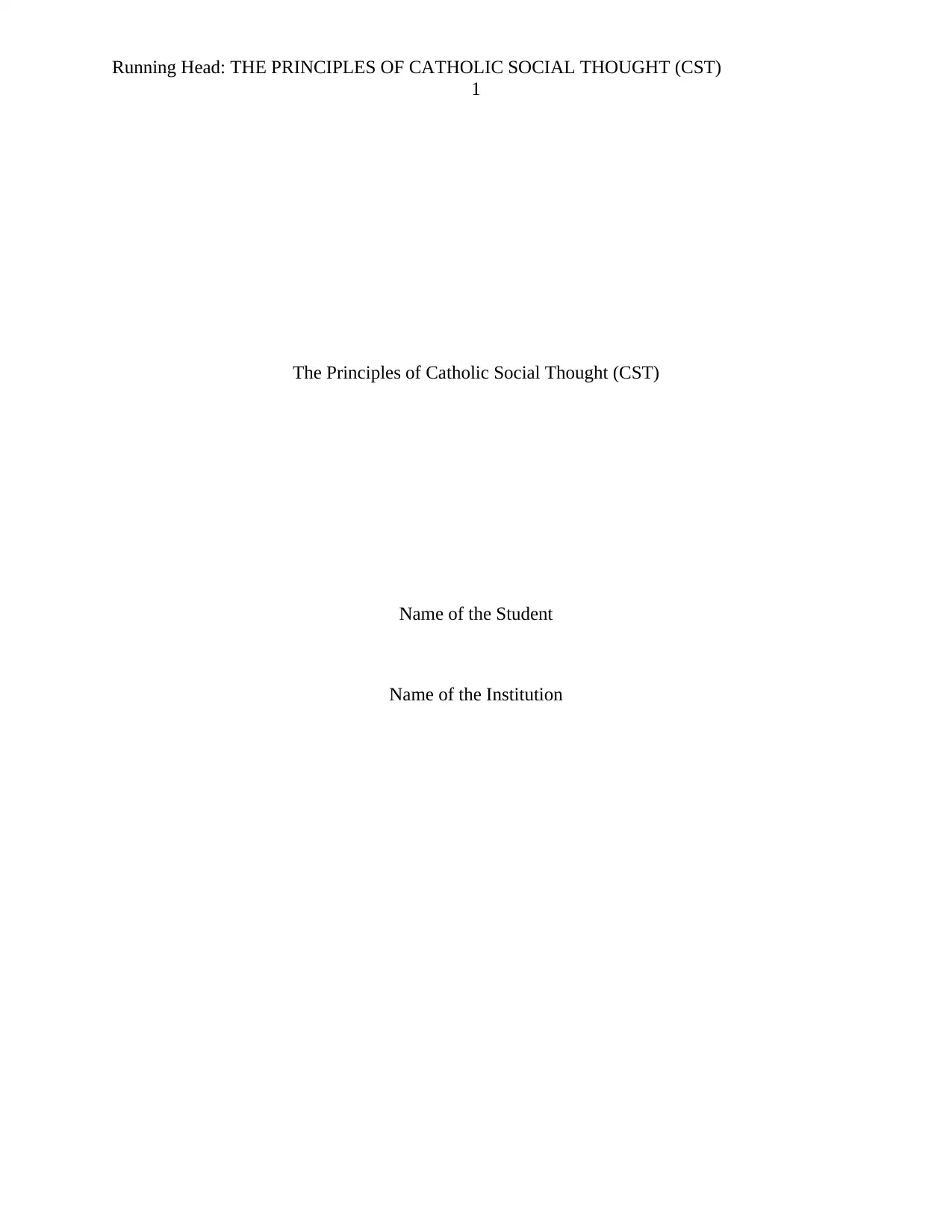
Running Head: THE PRINCIPLES OF CATHOLIC SOCIAL THOUGHT (CST)
1
The Principles of Catholic Social Thought (CST)
Name of the Student
Name of the Institution
1
The Principles of Catholic Social Thought (CST)
Name of the Student
Name of the Institution
Paraphrase This Document
Need a fresh take? Get an instant paraphrase of this document with our AI Paraphraser
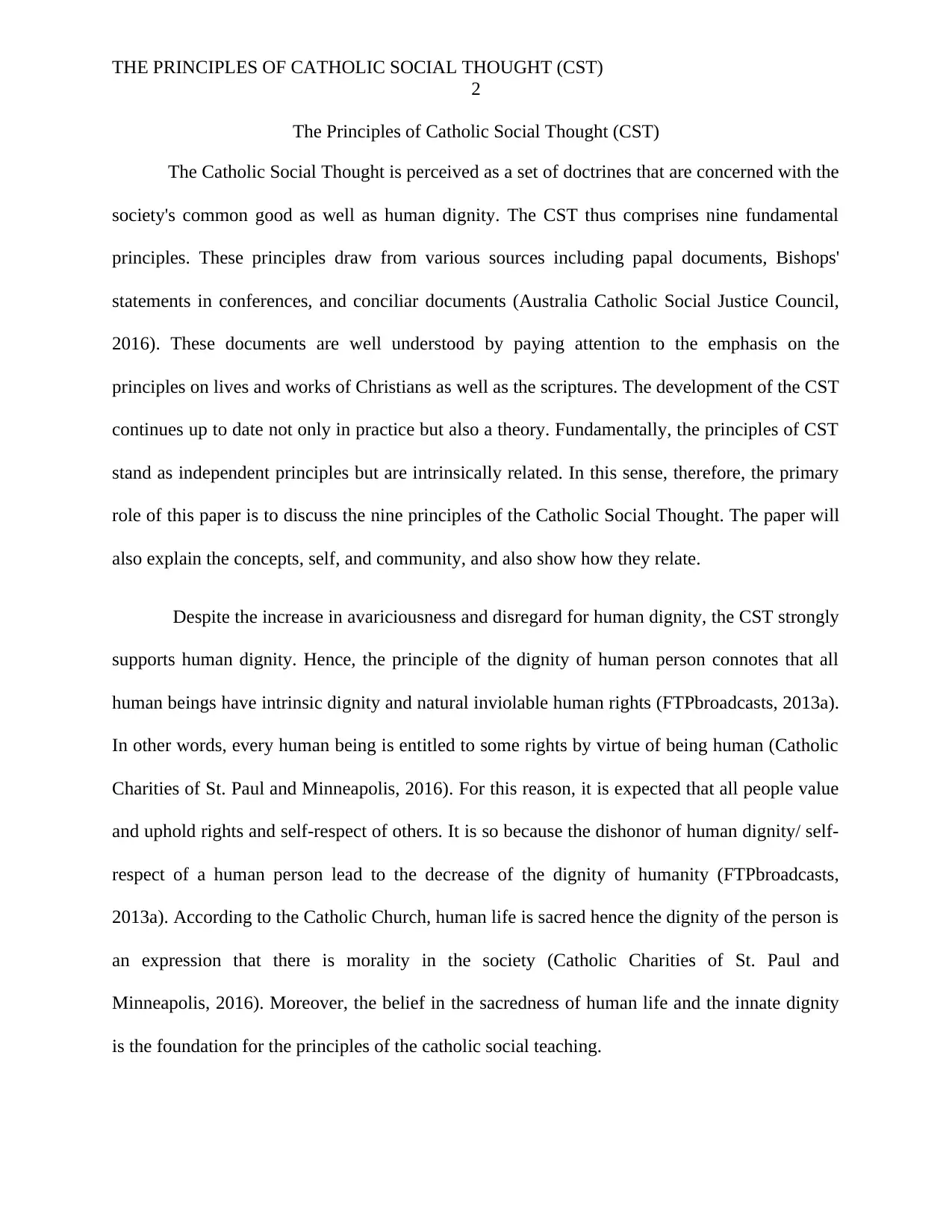
THE PRINCIPLES OF CATHOLIC SOCIAL THOUGHT (CST)
2
The Principles of Catholic Social Thought (CST)
The Catholic Social Thought is perceived as a set of doctrines that are concerned with the
society's common good as well as human dignity. The CST thus comprises nine fundamental
principles. These principles draw from various sources including papal documents, Bishops'
statements in conferences, and conciliar documents (Australia Catholic Social Justice Council,
2016). These documents are well understood by paying attention to the emphasis on the
principles on lives and works of Christians as well as the scriptures. The development of the CST
continues up to date not only in practice but also a theory. Fundamentally, the principles of CST
stand as independent principles but are intrinsically related. In this sense, therefore, the primary
role of this paper is to discuss the nine principles of the Catholic Social Thought. The paper will
also explain the concepts, self, and community, and also show how they relate.
Despite the increase in avariciousness and disregard for human dignity, the CST strongly
supports human dignity. Hence, the principle of the dignity of human person connotes that all
human beings have intrinsic dignity and natural inviolable human rights (FTPbroadcasts, 2013a).
In other words, every human being is entitled to some rights by virtue of being human (Catholic
Charities of St. Paul and Minneapolis, 2016). For this reason, it is expected that all people value
and uphold rights and self-respect of others. It is so because the dishonor of human dignity/ self-
respect of a human person lead to the decrease of the dignity of humanity (FTPbroadcasts,
2013a). According to the Catholic Church, human life is sacred hence the dignity of the person is
an expression that there is morality in the society (Catholic Charities of St. Paul and
Minneapolis, 2016). Moreover, the belief in the sacredness of human life and the innate dignity
is the foundation for the principles of the catholic social teaching.
2
The Principles of Catholic Social Thought (CST)
The Catholic Social Thought is perceived as a set of doctrines that are concerned with the
society's common good as well as human dignity. The CST thus comprises nine fundamental
principles. These principles draw from various sources including papal documents, Bishops'
statements in conferences, and conciliar documents (Australia Catholic Social Justice Council,
2016). These documents are well understood by paying attention to the emphasis on the
principles on lives and works of Christians as well as the scriptures. The development of the CST
continues up to date not only in practice but also a theory. Fundamentally, the principles of CST
stand as independent principles but are intrinsically related. In this sense, therefore, the primary
role of this paper is to discuss the nine principles of the Catholic Social Thought. The paper will
also explain the concepts, self, and community, and also show how they relate.
Despite the increase in avariciousness and disregard for human dignity, the CST strongly
supports human dignity. Hence, the principle of the dignity of human person connotes that all
human beings have intrinsic dignity and natural inviolable human rights (FTPbroadcasts, 2013a).
In other words, every human being is entitled to some rights by virtue of being human (Catholic
Charities of St. Paul and Minneapolis, 2016). For this reason, it is expected that all people value
and uphold rights and self-respect of others. It is so because the dishonor of human dignity/ self-
respect of a human person lead to the decrease of the dignity of humanity (FTPbroadcasts,
2013a). According to the Catholic Church, human life is sacred hence the dignity of the person is
an expression that there is morality in the society (Catholic Charities of St. Paul and
Minneapolis, 2016). Moreover, the belief in the sacredness of human life and the innate dignity
is the foundation for the principles of the catholic social teaching.
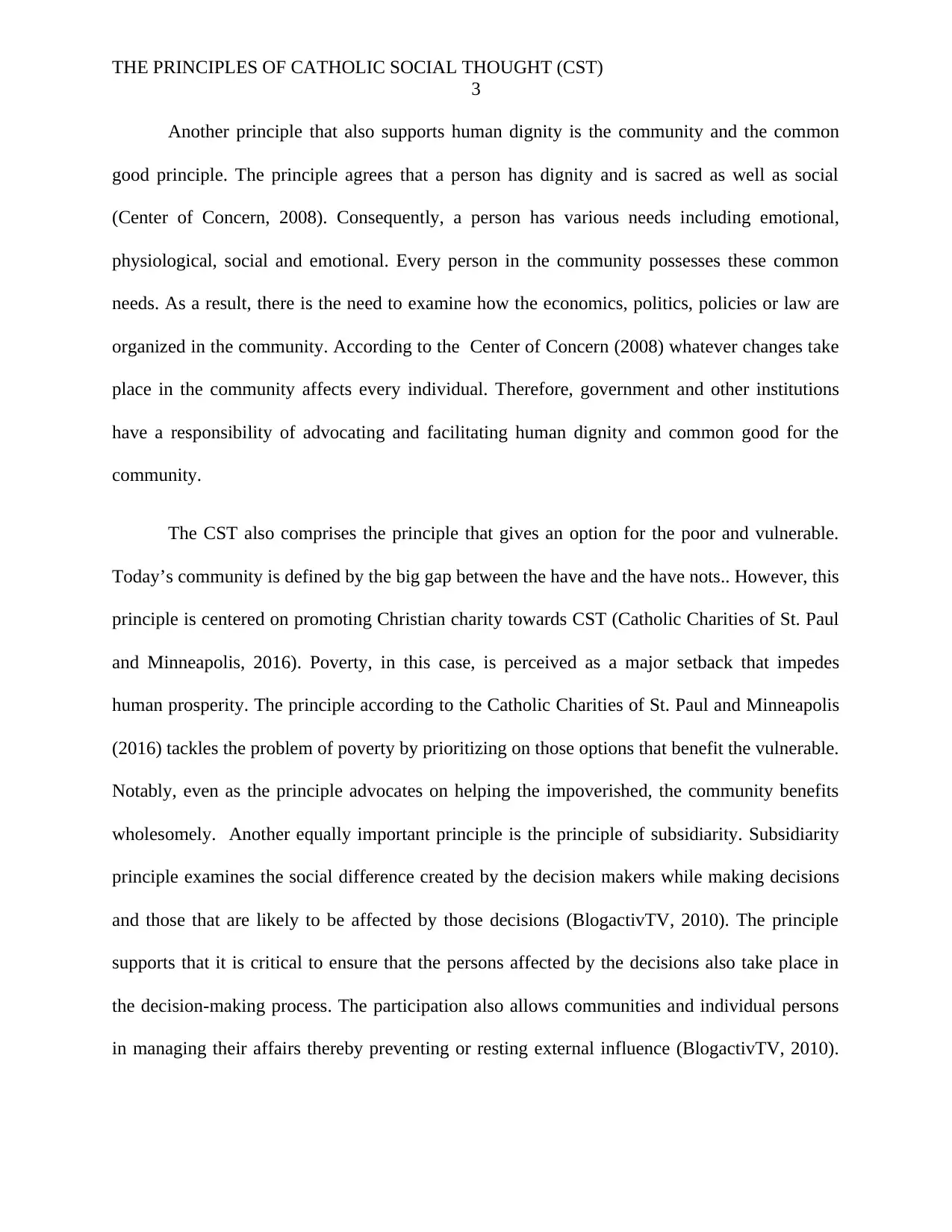
THE PRINCIPLES OF CATHOLIC SOCIAL THOUGHT (CST)
3
Another principle that also supports human dignity is the community and the common
good principle. The principle agrees that a person has dignity and is sacred as well as social
(Center of Concern, 2008). Consequently, a person has various needs including emotional,
physiological, social and emotional. Every person in the community possesses these common
needs. As a result, there is the need to examine how the economics, politics, policies or law are
organized in the community. According to the Center of Concern (2008) whatever changes take
place in the community affects every individual. Therefore, government and other institutions
have a responsibility of advocating and facilitating human dignity and common good for the
community.
The CST also comprises the principle that gives an option for the poor and vulnerable.
Today’s community is defined by the big gap between the have and the have nots.. However, this
principle is centered on promoting Christian charity towards CST (Catholic Charities of St. Paul
and Minneapolis, 2016). Poverty, in this case, is perceived as a major setback that impedes
human prosperity. The principle according to the Catholic Charities of St. Paul and Minneapolis
(2016) tackles the problem of poverty by prioritizing on those options that benefit the vulnerable.
Notably, even as the principle advocates on helping the impoverished, the community benefits
wholesomely. Another equally important principle is the principle of subsidiarity. Subsidiarity
principle examines the social difference created by the decision makers while making decisions
and those that are likely to be affected by those decisions (BlogactivTV, 2010). The principle
supports that it is critical to ensure that the persons affected by the decisions also take place in
the decision-making process. The participation also allows communities and individual persons
in managing their affairs thereby preventing or resting external influence (BlogactivTV, 2010).
3
Another principle that also supports human dignity is the community and the common
good principle. The principle agrees that a person has dignity and is sacred as well as social
(Center of Concern, 2008). Consequently, a person has various needs including emotional,
physiological, social and emotional. Every person in the community possesses these common
needs. As a result, there is the need to examine how the economics, politics, policies or law are
organized in the community. According to the Center of Concern (2008) whatever changes take
place in the community affects every individual. Therefore, government and other institutions
have a responsibility of advocating and facilitating human dignity and common good for the
community.
The CST also comprises the principle that gives an option for the poor and vulnerable.
Today’s community is defined by the big gap between the have and the have nots.. However, this
principle is centered on promoting Christian charity towards CST (Catholic Charities of St. Paul
and Minneapolis, 2016). Poverty, in this case, is perceived as a major setback that impedes
human prosperity. The principle according to the Catholic Charities of St. Paul and Minneapolis
(2016) tackles the problem of poverty by prioritizing on those options that benefit the vulnerable.
Notably, even as the principle advocates on helping the impoverished, the community benefits
wholesomely. Another equally important principle is the principle of subsidiarity. Subsidiarity
principle examines the social difference created by the decision makers while making decisions
and those that are likely to be affected by those decisions (BlogactivTV, 2010). The principle
supports that it is critical to ensure that the persons affected by the decisions also take place in
the decision-making process. The participation also allows communities and individual persons
in managing their affairs thereby preventing or resting external influence (BlogactivTV, 2010).
⊘ This is a preview!⊘
Do you want full access?
Subscribe today to unlock all pages.

Trusted by 1+ million students worldwide
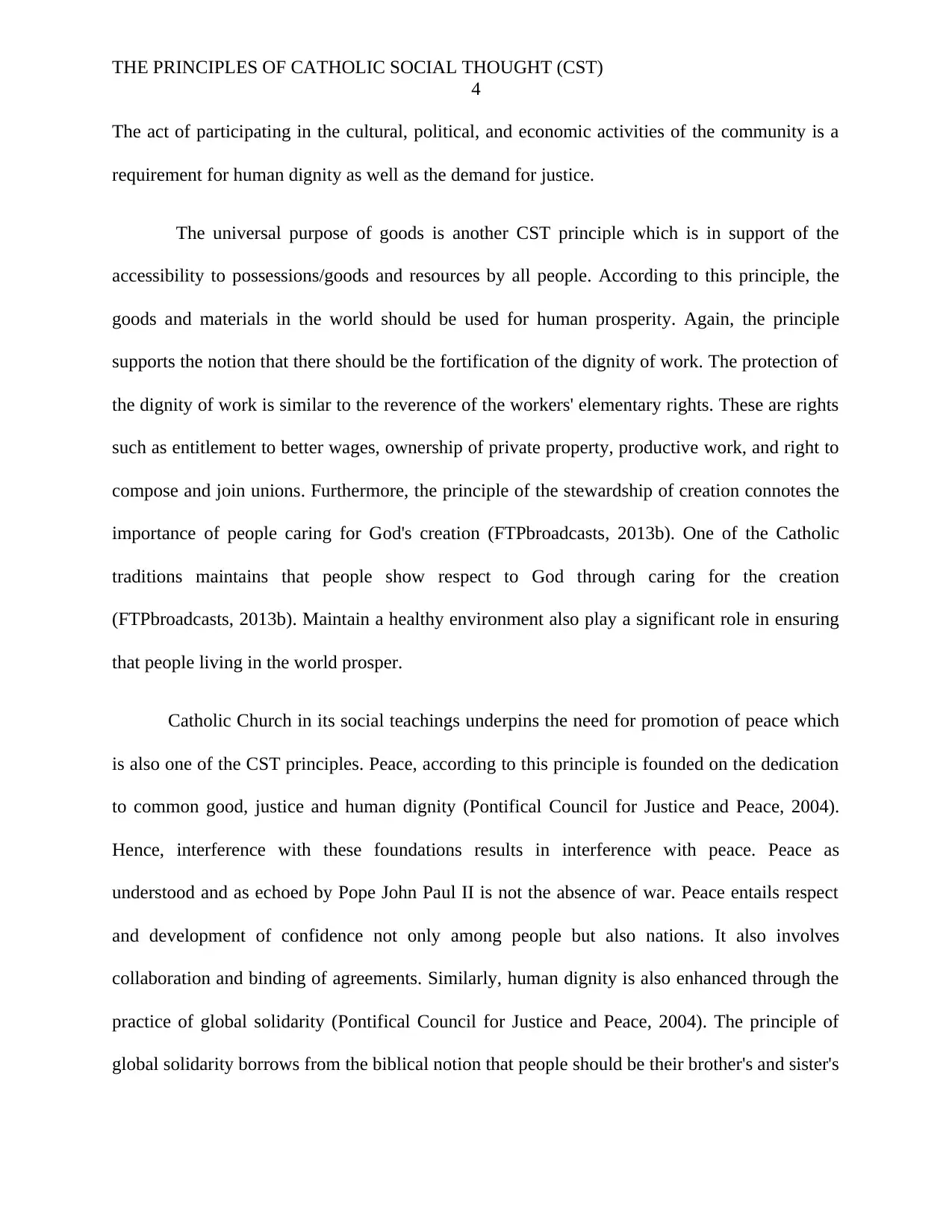
THE PRINCIPLES OF CATHOLIC SOCIAL THOUGHT (CST)
4
The act of participating in the cultural, political, and economic activities of the community is a
requirement for human dignity as well as the demand for justice.
The universal purpose of goods is another CST principle which is in support of the
accessibility to possessions/goods and resources by all people. According to this principle, the
goods and materials in the world should be used for human prosperity. Again, the principle
supports the notion that there should be the fortification of the dignity of work. The protection of
the dignity of work is similar to the reverence of the workers' elementary rights. These are rights
such as entitlement to better wages, ownership of private property, productive work, and right to
compose and join unions. Furthermore, the principle of the stewardship of creation connotes the
importance of people caring for God's creation (FTPbroadcasts, 2013b). One of the Catholic
traditions maintains that people show respect to God through caring for the creation
(FTPbroadcasts, 2013b). Maintain a healthy environment also play a significant role in ensuring
that people living in the world prosper.
Catholic Church in its social teachings underpins the need for promotion of peace which
is also one of the CST principles. Peace, according to this principle is founded on the dedication
to common good, justice and human dignity (Pontifical Council for Justice and Peace, 2004).
Hence, interference with these foundations results in interference with peace. Peace as
understood and as echoed by Pope John Paul II is not the absence of war. Peace entails respect
and development of confidence not only among people but also nations. It also involves
collaboration and binding of agreements. Similarly, human dignity is also enhanced through the
practice of global solidarity (Pontifical Council for Justice and Peace, 2004). The principle of
global solidarity borrows from the biblical notion that people should be their brother's and sister's
4
The act of participating in the cultural, political, and economic activities of the community is a
requirement for human dignity as well as the demand for justice.
The universal purpose of goods is another CST principle which is in support of the
accessibility to possessions/goods and resources by all people. According to this principle, the
goods and materials in the world should be used for human prosperity. Again, the principle
supports the notion that there should be the fortification of the dignity of work. The protection of
the dignity of work is similar to the reverence of the workers' elementary rights. These are rights
such as entitlement to better wages, ownership of private property, productive work, and right to
compose and join unions. Furthermore, the principle of the stewardship of creation connotes the
importance of people caring for God's creation (FTPbroadcasts, 2013b). One of the Catholic
traditions maintains that people show respect to God through caring for the creation
(FTPbroadcasts, 2013b). Maintain a healthy environment also play a significant role in ensuring
that people living in the world prosper.
Catholic Church in its social teachings underpins the need for promotion of peace which
is also one of the CST principles. Peace, according to this principle is founded on the dedication
to common good, justice and human dignity (Pontifical Council for Justice and Peace, 2004).
Hence, interference with these foundations results in interference with peace. Peace as
understood and as echoed by Pope John Paul II is not the absence of war. Peace entails respect
and development of confidence not only among people but also nations. It also involves
collaboration and binding of agreements. Similarly, human dignity is also enhanced through the
practice of global solidarity (Pontifical Council for Justice and Peace, 2004). The principle of
global solidarity borrows from the biblical notion that people should be their brother's and sister's
Paraphrase This Document
Need a fresh take? Get an instant paraphrase of this document with our AI Paraphraser
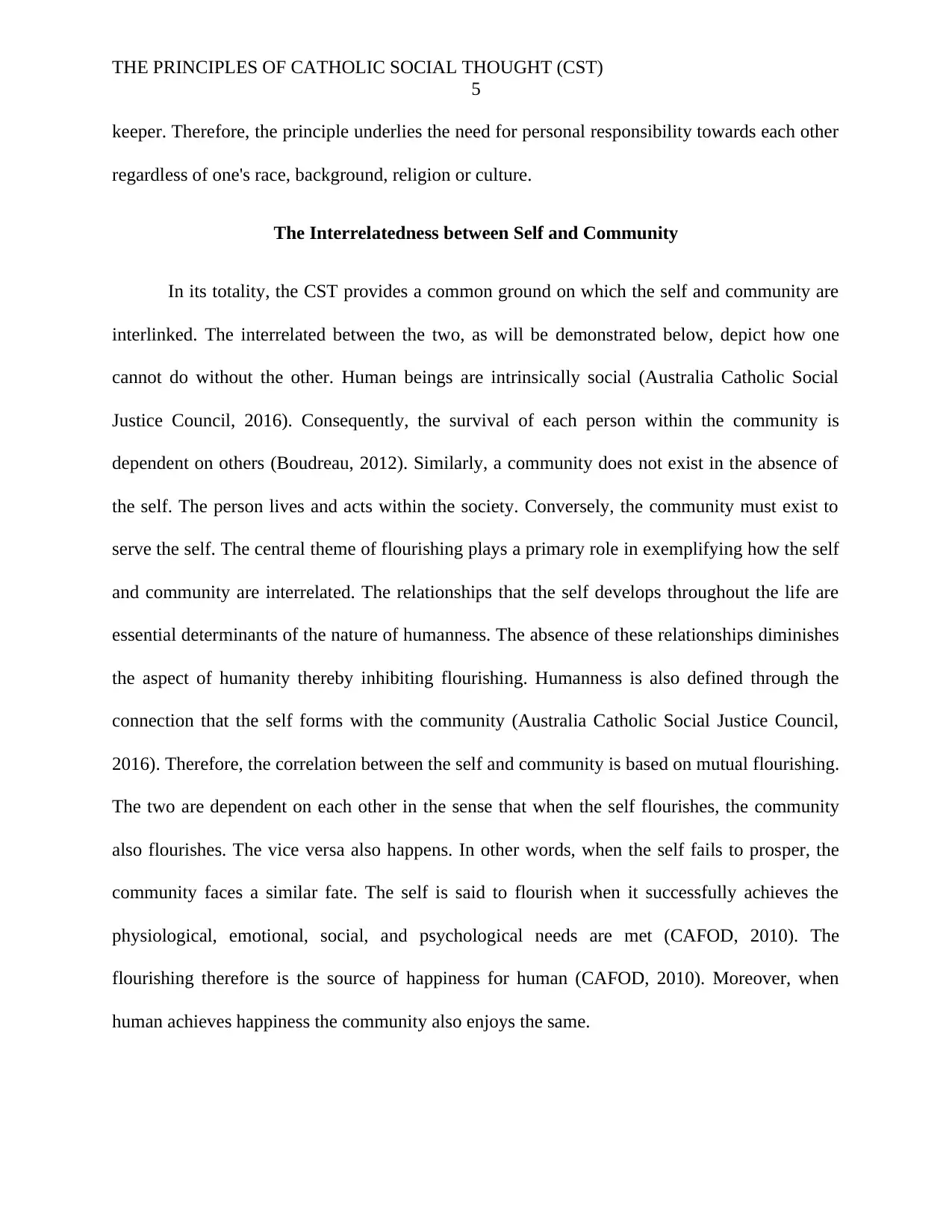
THE PRINCIPLES OF CATHOLIC SOCIAL THOUGHT (CST)
5
keeper. Therefore, the principle underlies the need for personal responsibility towards each other
regardless of one's race, background, religion or culture.
The Interrelatedness between Self and Community
In its totality, the CST provides a common ground on which the self and community are
interlinked. The interrelated between the two, as will be demonstrated below, depict how one
cannot do without the other. Human beings are intrinsically social (Australia Catholic Social
Justice Council, 2016). Consequently, the survival of each person within the community is
dependent on others (Boudreau, 2012). Similarly, a community does not exist in the absence of
the self. The person lives and acts within the society. Conversely, the community must exist to
serve the self. The central theme of flourishing plays a primary role in exemplifying how the self
and community are interrelated. The relationships that the self develops throughout the life are
essential determinants of the nature of humanness. The absence of these relationships diminishes
the aspect of humanity thereby inhibiting flourishing. Humanness is also defined through the
connection that the self forms with the community (Australia Catholic Social Justice Council,
2016). Therefore, the correlation between the self and community is based on mutual flourishing.
The two are dependent on each other in the sense that when the self flourishes, the community
also flourishes. The vice versa also happens. In other words, when the self fails to prosper, the
community faces a similar fate. The self is said to flourish when it successfully achieves the
physiological, emotional, social, and psychological needs are met (CAFOD, 2010). The
flourishing therefore is the source of happiness for human (CAFOD, 2010). Moreover, when
human achieves happiness the community also enjoys the same.
5
keeper. Therefore, the principle underlies the need for personal responsibility towards each other
regardless of one's race, background, religion or culture.
The Interrelatedness between Self and Community
In its totality, the CST provides a common ground on which the self and community are
interlinked. The interrelated between the two, as will be demonstrated below, depict how one
cannot do without the other. Human beings are intrinsically social (Australia Catholic Social
Justice Council, 2016). Consequently, the survival of each person within the community is
dependent on others (Boudreau, 2012). Similarly, a community does not exist in the absence of
the self. The person lives and acts within the society. Conversely, the community must exist to
serve the self. The central theme of flourishing plays a primary role in exemplifying how the self
and community are interrelated. The relationships that the self develops throughout the life are
essential determinants of the nature of humanness. The absence of these relationships diminishes
the aspect of humanity thereby inhibiting flourishing. Humanness is also defined through the
connection that the self forms with the community (Australia Catholic Social Justice Council,
2016). Therefore, the correlation between the self and community is based on mutual flourishing.
The two are dependent on each other in the sense that when the self flourishes, the community
also flourishes. The vice versa also happens. In other words, when the self fails to prosper, the
community faces a similar fate. The self is said to flourish when it successfully achieves the
physiological, emotional, social, and psychological needs are met (CAFOD, 2010). The
flourishing therefore is the source of happiness for human (CAFOD, 2010). Moreover, when
human achieves happiness the community also enjoys the same.
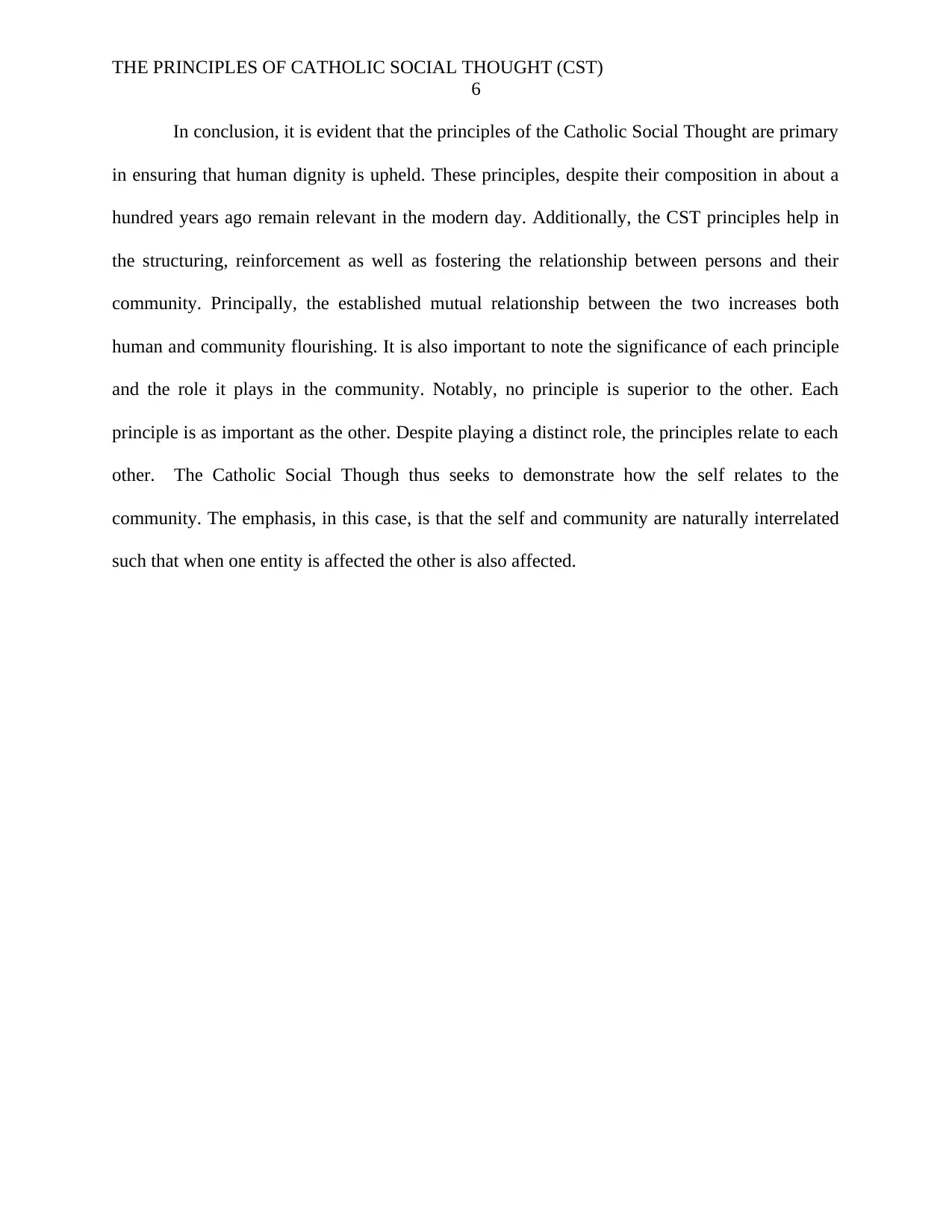
THE PRINCIPLES OF CATHOLIC SOCIAL THOUGHT (CST)
6
In conclusion, it is evident that the principles of the Catholic Social Thought are primary
in ensuring that human dignity is upheld. These principles, despite their composition in about a
hundred years ago remain relevant in the modern day. Additionally, the CST principles help in
the structuring, reinforcement as well as fostering the relationship between persons and their
community. Principally, the established mutual relationship between the two increases both
human and community flourishing. It is also important to note the significance of each principle
and the role it plays in the community. Notably, no principle is superior to the other. Each
principle is as important as the other. Despite playing a distinct role, the principles relate to each
other. The Catholic Social Though thus seeks to demonstrate how the self relates to the
community. The emphasis, in this case, is that the self and community are naturally interrelated
such that when one entity is affected the other is also affected.
6
In conclusion, it is evident that the principles of the Catholic Social Thought are primary
in ensuring that human dignity is upheld. These principles, despite their composition in about a
hundred years ago remain relevant in the modern day. Additionally, the CST principles help in
the structuring, reinforcement as well as fostering the relationship between persons and their
community. Principally, the established mutual relationship between the two increases both
human and community flourishing. It is also important to note the significance of each principle
and the role it plays in the community. Notably, no principle is superior to the other. Each
principle is as important as the other. Despite playing a distinct role, the principles relate to each
other. The Catholic Social Though thus seeks to demonstrate how the self relates to the
community. The emphasis, in this case, is that the self and community are naturally interrelated
such that when one entity is affected the other is also affected.
⊘ This is a preview!⊘
Do you want full access?
Subscribe today to unlock all pages.

Trusted by 1+ million students worldwide
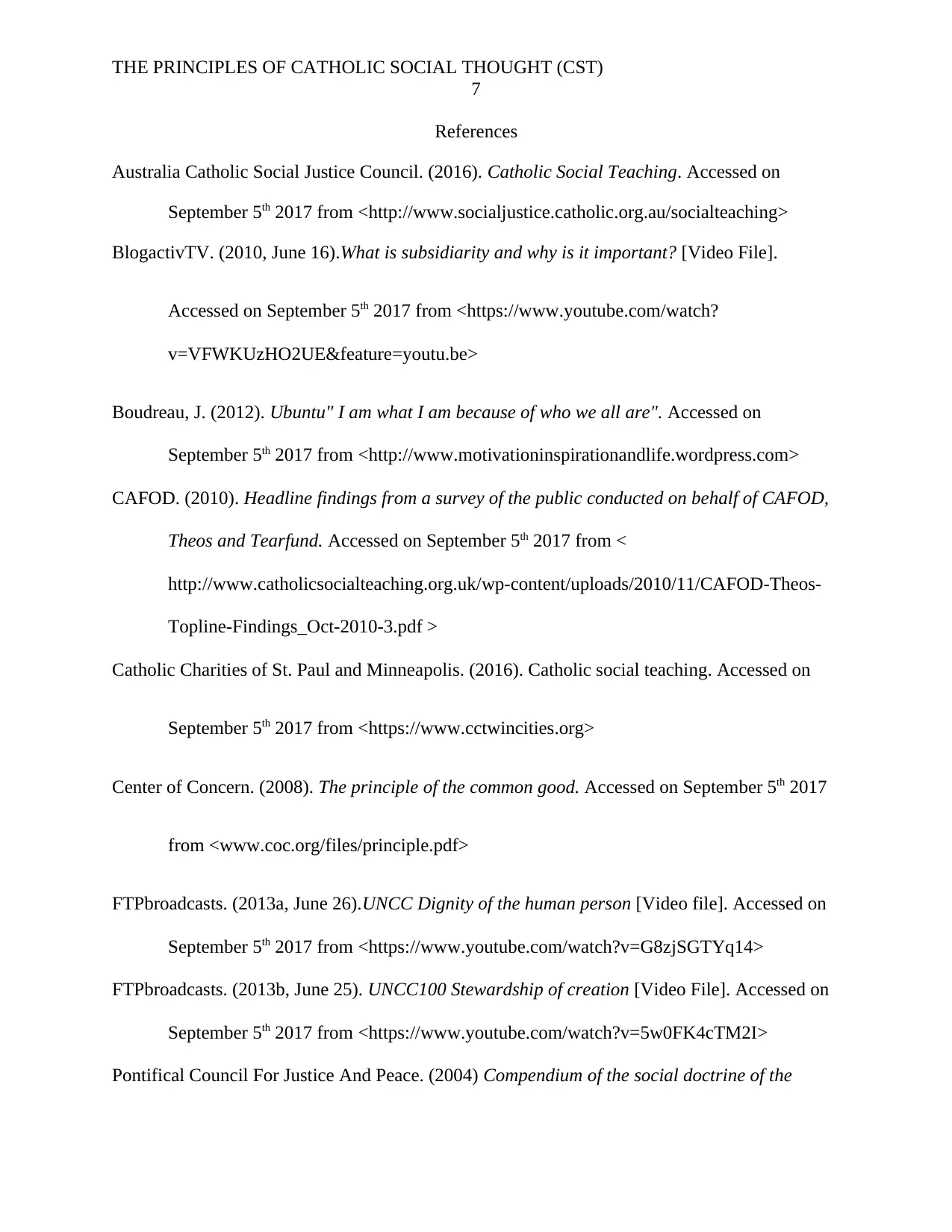
THE PRINCIPLES OF CATHOLIC SOCIAL THOUGHT (CST)
7
References
Australia Catholic Social Justice Council. (2016). Catholic Social Teaching. Accessed on
September 5th 2017 from <http://www.socialjustice.catholic.org.au/socialteaching>
BlogactivTV. (2010, June 16).What is subsidiarity and why is it important? [Video File].
Accessed on September 5th 2017 from <https://www.youtube.com/watch?
v=VFWKUzHO2UE&feature=youtu.be>
Boudreau, J. (2012). Ubuntu" I am what I am because of who we all are". Accessed on
September 5th 2017 from <http://www.motivationinspirationandlife.wordpress.com>
CAFOD. (2010). Headline findings from a survey of the public conducted on behalf of CAFOD,
Theos and Tearfund. Accessed on September 5th 2017 from <
http://www.catholicsocialteaching.org.uk/wp-content/uploads/2010/11/CAFOD-Theos-
Topline-Findings_Oct-2010-3.pdf >
Catholic Charities of St. Paul and Minneapolis. (2016). Catholic social teaching. Accessed on
September 5th 2017 from <https://www.cctwincities.org>
Center of Concern. (2008). The principle of the common good. Accessed on September 5th 2017
from <www.coc.org/files/principle.pdf>
FTPbroadcasts. (2013a, June 26).UNCC Dignity of the human person [Video file]. Accessed on
September 5th 2017 from <https://www.youtube.com/watch?v=G8zjSGTYq14>
FTPbroadcasts. (2013b, June 25). UNCC100 Stewardship of creation [Video File]. Accessed on
September 5th 2017 from <https://www.youtube.com/watch?v=5w0FK4cTM2I>
Pontifical Council For Justice And Peace. (2004) Compendium of the social doctrine of the
7
References
Australia Catholic Social Justice Council. (2016). Catholic Social Teaching. Accessed on
September 5th 2017 from <http://www.socialjustice.catholic.org.au/socialteaching>
BlogactivTV. (2010, June 16).What is subsidiarity and why is it important? [Video File].
Accessed on September 5th 2017 from <https://www.youtube.com/watch?
v=VFWKUzHO2UE&feature=youtu.be>
Boudreau, J. (2012). Ubuntu" I am what I am because of who we all are". Accessed on
September 5th 2017 from <http://www.motivationinspirationandlife.wordpress.com>
CAFOD. (2010). Headline findings from a survey of the public conducted on behalf of CAFOD,
Theos and Tearfund. Accessed on September 5th 2017 from <
http://www.catholicsocialteaching.org.uk/wp-content/uploads/2010/11/CAFOD-Theos-
Topline-Findings_Oct-2010-3.pdf >
Catholic Charities of St. Paul and Minneapolis. (2016). Catholic social teaching. Accessed on
September 5th 2017 from <https://www.cctwincities.org>
Center of Concern. (2008). The principle of the common good. Accessed on September 5th 2017
from <www.coc.org/files/principle.pdf>
FTPbroadcasts. (2013a, June 26).UNCC Dignity of the human person [Video file]. Accessed on
September 5th 2017 from <https://www.youtube.com/watch?v=G8zjSGTYq14>
FTPbroadcasts. (2013b, June 25). UNCC100 Stewardship of creation [Video File]. Accessed on
September 5th 2017 from <https://www.youtube.com/watch?v=5w0FK4cTM2I>
Pontifical Council For Justice And Peace. (2004) Compendium of the social doctrine of the
Paraphrase This Document
Need a fresh take? Get an instant paraphrase of this document with our AI Paraphraser

THE PRINCIPLES OF CATHOLIC SOCIAL THOUGHT (CST)
8
church. Accessed on September 5th 2017 from
<http://www.vatican.va/roman_curia/pontifical_councils/justpeace/documents/
rc_pc_justpeace_doc_20060526_compendiodottsoc_en.html#Origin and meaning>
8
church. Accessed on September 5th 2017 from
<http://www.vatican.va/roman_curia/pontifical_councils/justpeace/documents/
rc_pc_justpeace_doc_20060526_compendiodottsoc_en.html#Origin and meaning>
1 out of 8
Related Documents
Your All-in-One AI-Powered Toolkit for Academic Success.
+13062052269
info@desklib.com
Available 24*7 on WhatsApp / Email
![[object Object]](/_next/static/media/star-bottom.7253800d.svg)
Unlock your academic potential
Copyright © 2020–2026 A2Z Services. All Rights Reserved. Developed and managed by ZUCOL.




